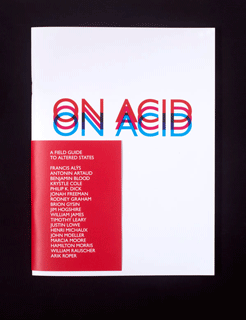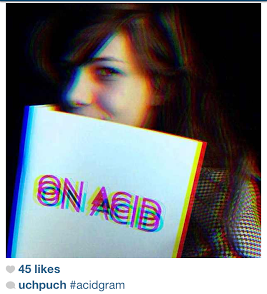VERTEX: You are known as one of the first authors to experiment with LSD. What effect has it had on your writing?
DICK: I don't know of any. It's always possible that it's had an effect I don't know about. Take my novel The Three Stigmata of Palmer Eldritch, which deals with a tremendous bad acid trip, so to speak. I wrote that before I had ever seen LSD. I wrote that from just reading a description of the discovery of it and the kind of effect it had. So if that, which is my major novel of a hallucinogenic kind, came without my ever having taken LSD, then I would say even my work following LSD which had hallucinations in it could easily have been written without taking acid.
VERTEX: Isn't "Faith of Our Father's," from Harlan Ellison's Dangerous Visions, supposed to have been inspired by or written under the influence of acid?
DICK: That really is not true. First of all, you can't write anything when you're on acid. I did one page once while on an acid trip, but it was in Latin. Whole damn thing was in Latin and a little tiny bit in Sanskrit, and there's not much market for that. The page does not fall in with my published work. The other book which suggests it might have been written with acid is Martian Time-slip. That too was written before I had taken any acid.
VERTEX: How much acid did you take anyway?
DICK: Not that much. I wan't getting up in the morning and dropping acid. I'm amazed when I read the things I used to say about it on the blurbs of my books. I wrote this myself: "He has been experimenting with hallucinogenic drugs to find the unchanging reality beneath our delusions." And now I say, "Good Christ!" All I ever found out about acid was that I was where I wanted to get out of fast. It didn't seem more real than anything else; it just seemed more awful.
VERTEX: In the light of your own experiences with acid, how accurate do you think The Three Stigmata of Palmer Eldritch is as far as drugs are concerned?
DICK: You remember what happened when they got on that drug? It was bad, wasn't it? It was so bad it taxed my ability to imagine bad. And it didn't do them any good to stop taking the drug because they had flashbacks. And nobody at the time knew LSD was going to produce flashbacks. I had it in mind that the ultimate horror would be to get an addictive, hallucinogenic drug out of your system and you would say, "Well, I'm back in the real world now." And suddenly a monstrous object from the hallucinogenic world would cross the floor and you would realize that you were not back. And this is what has happened to many people who have dropped acid. It was just an accidental prophecy on my part.
VERTEX: Doesn't your latest novel, A Scanner Darkly, also deal with drugs?
DICK: It's about an undercover agent who must take dope to conceal his cover and the dope damages his brain progressively, as well as making him an addict. The book follows him along to the end until his brain is damaged to such an extent that he can no longer wash pots and pans in the kitchen of a rehabilitation center. I hope the reader won't say, "Boy! I bet he did that!" This is the verisimilitude the author is trying to create, the sense that the novel actually is real. Now I was at a heroin rehab center in Canada, and I did draw from it, and I've had friends who dropped acid and became permanently psychotic. And a number who killed themselves too. But I wouldn't say that if affected my writing directly, that the acid wrote the book.



No comments:
Post a Comment